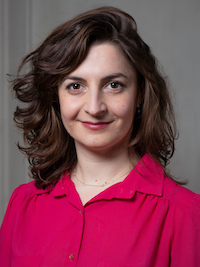In the same section

anemona.constantin@ulb.be
Adresse :
Institut d'Études européennes (IEE) - ULB
Avenue F.D. Roosevelt, 39 - CP 172
1050 Bruxelles
Office : R39.2.307
Bio
I am a Postdoctoral Research Fellow at CEVIPOL/ULB since October 2023 and a member of the FNRS project 'How the European Union copes with ‘identity politics’ (2019-2024)' supervised by Prof. François Foret. My current research focuses on EU legitimizing narratives in higher education and research and their contribution to European integration and community-building.
My main areas of expertise are the sociology of intellectuals and the social history of ideas, with a focus on conservative and libertarian think tanks and their transnational networks in Europe, the United States, and Latin America. My research explores the production and circulation of conservative ideas across these regions, the socio-professional background of their authors, and their participation in the rise of ‘illiberal’ political parties and leaders.
Previously, my PhD research was dedicated to the sociology of memory of fascism and communism in Eastern Europe (Romania, Bulgaria, and Moldova) after the fall of the Berlin Wall in 1989.
CV
- 2023 – 2024: Fellowship (2 years) at the CEVIPOL, ULB. Research project 'How the European Union copes with ‘identity politics’ (2019-2024)' (PI Prof. François Foret)
- 2022 – 2023: Fellowship (2 years) at the French Research Center in Humanities and Social Sciences (CEFRES), Prague Research project: ‘Romanian conservative intellectuals and the backsliding of democracy in Central Eastern Europe in transnational perspective’, https://cefres.cz/fr/18183.
- 2020 – 2021: Fellowship (1 year) at the Research Institute of the University of Bucharest, Bucharest. Research project: ‘The internationalization of Romanian anticommunism. Transnational biographies and the circulation of knowledge’, https://icub.unibuc.ro/user/anemona+constantin/
- 2018 – 2020: Team member research project ‘Transitional justice and memory in Romania in global perspective’ (grant ‘Young Team’, Romanian Research Agency) at the Center for the Study of Equal Opportunity Policies, University of Bucharest, https://transnationalmemory.wordpress.com/our-project/
- 2016 – 2019 : Team member research project ‘The criminalization of dictatorial pasts in Europe and Latin America in global perspective’ (co-funded by the LABEX ‘Les passés dans le présent’ (CNRS, France) and the Arts and Humanities Research Council “Care for the Future” (United-Kingdom), Institute of the Social Sciences of Politics, University
Paris Nanterre - University of Exeter, https://criminalizationofdictatorialpasts.wordpress.com/about/
Areas of research
- Social history of political ideas
- Sociology of intellectuals
- Conservative/illiberal mobilizations and transnational networks
- Regime change, democratization, dealing with the past in Central Eastern Europe
- EU narratives and European integration
- Teaching
-
General sociology (course), University Paris-Est Créteil, Health Sciences Department, Year I level, 2021-2022
Social history of political ideas (tutorial), University Paris Nanterre, Law and Political Science
Department, Level MA of political science, 2009-2011
Introduction in political science (tutorial), University Paris Nanterre, Law and Political Science
Department, Year I level, 2006-2011
Methods in political sociology (tutorial), University Paris Nanterre, Law and Political Science
Department, Year I & II level, 2006-2007
- Research
-
My research focuses on the production, circulation, and appropriation of political ideas, and the political engagement of intellectuals. I am particularly interested in their involvement in the exercise of power and their role in crafting historical and political narratives that shape collective memories of political pasts.
After completing a Master’s thesis on the radicalization of Romanian intellectuals to fascism in the 1930s, I dedicated my doctoral research to the symbolic battles surrounding this engagement in the present. My dissertation analysed the regime change in Romania after 1989 through the lens of intellectual reconfigurations. It explored the emergence of a new official history, from the perspective of the sociology of actors and investigated under which conditions the simultaneous condemnation of fascist and communist pasts, along with the invention of a local democratic tradition, occurred.
Participation in two international research projects, as well as the radicalization to conservatism of several political and public influential figures following Romania’s accession to the European Union in 2007, prompted me to expand my research by incorporating a transnational dimension. Since 2020, I have focused particularly on the interregional circulation —between Romania, Bulgaria, and Moldova— of narratives that criminalize the communist past, and on the participation of Eastern European intellectuals to transnational networks of conservative and libertarian think tanks. The breadth of these networks, their adaptability, and their connections with ‘illiberal’ governments—not only in Central and Eastern Europe but also in regions such as the United States and Latin America—let me to broaden my fieldwork and incorporate these additional areas.
- Publications
-
(co-authored with Valentin Behr) “From the library to the party. The International of conservative intellectuals” in Mathew Humphrey, David Laycock, Juliette Faure (Eds.). Routledge Handbook of Ideology Analysis, Routledge, 2025 (forthcoming)
“History of communism teaching in Eastern Europe: Bulgaria, Romania, The Republic of Moldova”, Passés Futurs, no. 9, July 2021, https://www.politika.io/fr/article/lenseignement-lhistoire-du-communisme-a-lest
(co-authored with Valentin Behr, Muriel Blaive, Laure Neumayer, Maté Zombory), “An anti- Communist consensus: The Black Book of Communism in Pan-European Perspective”, Special Issue „Transnational Activism and the Globalization of Anti-Communism after 1989”, Revue d’Études Comparatives Est-Ouest, no 4, September 2020, https://shs.cairn.info/revue-d-etudes-comparatives-est-ouest-2020-2-page-55?lang=fr
“Sighet Memorial between the ‘duty to remember’ and the constraints of history. A sociological analysis of an unlikely success story”, Studia Politica. Romanian Political Science Review, no. 3, 2018, https://www.ssoar.info/ssoar/handle/document/60116
